

Peeing on the Job - Guest post by Barbara Braxton. Barbara is a retired teacher-librarian from Australia who I have known for many years.
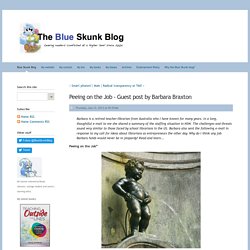
In a long, thoughtful e-mail to me she shared a summary of the staffing situation in NSW. The challenges and threats sound very similar to those faced by school librarians in the US. Barbara also sent the following e-mail in response to my call for ideas about librarians as entrepreneurs the other day. Why do I think any job Barbara holds would never be in jeopardy?
Read and learn... Peeing on the Job* Two weeks ago I gave a presentation to NSW teacher librarians which I called "Peeing on the Job" because it gave some ideas of why we should reach out to parents, peers, principals, pre-service teachers and politicians and how we could do that. I started by having participants consider and identify their purpose, position, policies, programs, procedures, practices and priorities (you can see why I gave the presentation that title) and two links I shared were.
Information literacy models. Topic71model. Nurturing Our Digital Literacy. American Association of School Librarians (AASL) Workbook for Selection Policy Writing. 50 Spelling Activities for 9-12 Year Olds - R.I.C. Publications. Supportstudents. Cational Licences. Skip to Content Switch page font size to: Small Medium/Default Large Smartcopying The Official Guide to Copyright Issues for Australian Schools and TAFE home copyright guidelines Copyright - a general overview What can I copy/communicate?
CO4_2012_Closer_Look_Report. 21st Century School Librarianship. LIBRARIANS MEDIA SPECIALISTS CHATBOARD - Welcome to the Librarians Media Specialists Chatboard. This forum is dedicated to discussions of issues related to curriculum support through library and media services and information sciences. Please bookmark thi. 21st Century Teacher-Librarians. Demonstrating Our Impact 1. Demonstrating Our Impact: Putting Numbers in Context Part 1Media Matters column, Leading and Learning, 2006-07, #2 One of my favorite quotes comes from George Bernard Shaw: “We should all be obliged to appear before a board every five years and justify our existence...on pain of liquidation.”
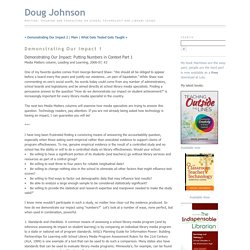
While Shaw was commenting on one’s social worth, his words today could come from any number of administrators, school boards and legislatures and be aimed directly at school library media specialists. Finding a persuasive answer to the question “How do we demonstrate our impact on student achievement?” Is increasingly important for every library media specialist in the country. The next two Media Matters columns will examine how media specialists are trying to answer this question. I have long been frustrated finding a convincing means of answering the accountability question, especially when those asking want empirical rather than anecdotal evidence to support claims of program effectiveness. 1. TLNing - A community for teacher-librarians and other educators. Fluid Environments for Life-Long Learning. The 21st century learner needs communication skills that transcend writing essays and technical skills that go beyond setting up margins for printing.
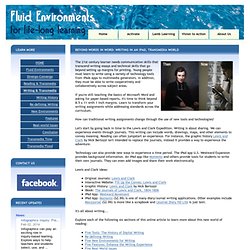
Young people must learn to write using a variety of technology tools from iPads apps to multimedia generators. In addition, they must be able to write cooperatively and collaboratively across subject areas. If you're still teaching the basics of Microsoft Word and asking for paper-based reports, it's time to think beyond 8.5 x 11 with 1 inch margins. Learn to transform your writing assignments while addressing standards across the curriculum. How can traditional writing assignments change through the use of new tools and technologies? Let's start by going back in time to the Lewis and Clark Expedition. Technology can also provide new ways to experience a time period. Lewis and Clark Ideas: It's all about writing... Explore each of the following six sections of this online article to learn more about this new world of reading: Irrefutable Evidence.
Challenges for teacher librarianship. In Part 1, published in Connections 66, page 10, Barbara Combes discussed the challenges that technology presents to teacher librarians and suggested strategies to effectively respond.
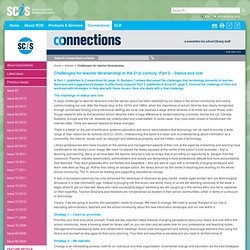
Part 2, published in Issue 67, page 5, covered the challenge of time and workload with strategies to help deal with these issues. Here she deals with a final challenge. The challenge of status and role A major challenge for teacher librarians over the last ten years has been establishing our status in the school community and clearly communicating our role. After the heady days of the 1970s and 1980s, when the importance of school libraries was clearly recognised through centralised funding and professional staffing, we have now reached a stage where libraries of all kinds are under threat, even though research tells us that proactive school libraries make a huge difference to student learning outcomes. Clearly, if we are going to survive, this perception needs to change. 21st Century Learning. Posted by Editor21C in Directions in Education, Early Childhood Education, Engaging Learning Environments, Primary Education, Secondary Education.
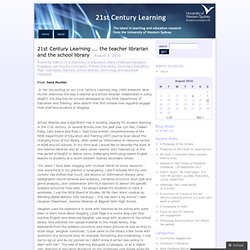
Tags: exemplary teachers, school libraries, technology and education trackback from Jane Hunter In her 3rd posting on our 21st Century Learning blog, UWS academic Jane Hunter examines the way a teacher and school librarian collaborated in using blogED, the blog tool for schools developed by the NSW Department of Education and Training. Jane reports that 800 schools now regularly engage their staff and students in blogging.